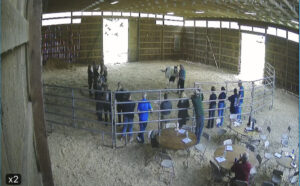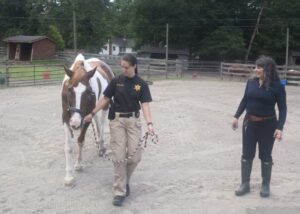Article:
NYSHA Continues Training Police – 2024
In early spring, Training Officer Montanya of the Dutchess County Sheriff’s Office reached out to NYSHA to request a training workshop, as the Sheriff had decided to become the lead agency to investigate animal cruelty cases in the county, with the DCSPCA acting as a support organization. The Officer contacted NYSHA because of our partnership with the Division of Criminal Justice Services and our years of providing such training to police throughout the state.
Law enforcement officers from various towns and cities throughout the County attended. Instructors included NYSHA Board Member, Marc Kissel, Esq. — the lead peace officer for the Hudson Valley Humane Society in Pomona and the instructor in the animal cruelty laws at the Rockland Municipal Police Academy. He explained how to understand and use the animal cruelty laws effectively. Veterinarian Dr. Isaac Angell of Bentley Veterinary discussed evaluating the appearance of animals with regard to cruelty complaints, and Dutchess Co. Senior Assistant District Attorney Scott Johnson, Esq., an experienced prosecutor on animal cruelty cases, advised attendees on how police should execute a search warrant in animal cases and collect evidence so the DA’s Office can make the best case possible. Attendees provided positive feedback in their evaluations, with one adding under suggestions, “To make this course, with these presentations, the basic Police Academy course.”

In early summer, Little Brook Farm in Old Chatham, a well-respected equine rescue run by Lynn Cross, held its yearly horse cruelty investigation workshop for State Police and other police agencies. NYSHA supports these workshops, since there is such a need for this training. Sue McDonough, retired State Police BCI Investigator, cruelty laws expert, and member of NYSHA’s Animal Cruelty Committee, taught attendees how to effectively investigate equine cruelty, a category of animal cruelty that sadly seems to be increasing yearly.
Dr. Steve Naile, a retired equine veterinarian, who has consulted on numerous horse cruelty cases, explained what officers should look for when they are called out on a complaint. After the official instruction was completed, Ms. Cross and staff provided the attendees with hands-on interaction with horses at Little Brook who had been rescued from cruelty situations. Police were instructed on how to place lead ropes on horses and walked them around the paddock, as well as provided with demonstrations on how to read body language. This full day of training will be invaluable to police when they are called out on a horse case. Several attendees made complimentary remarks to Ms. Cross, “I want to thank you for the class. Your commitment to animals is fantastic….I will certainly be better equipped in the field with my investigations. Please express my gratitude to Sue and Dr. Naile for their expertise as well. You are all VERY SPECIAL individuals.”
|
|
|
What you can do: Please continue to support NYSHA and the work it does to aid animals. And if you see an animal in a cruelty situation, be that animal’s voice, call the police or area SPCA and later follow up to ensure that the situation was addressed. If they seem to need guidance, advise them to contact NYSHA, as we will refer them to our experts.
New York State Humane Association Humane Review, Vol. XLIV, Fall 2024.

